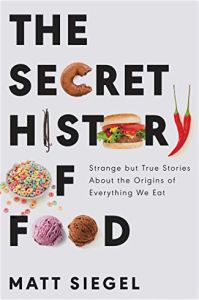Join getAbstract to access the summary!

Join getAbstract to access the summary!
Matt Siegel
The Secret History of Food
Strange but True Stories About the Origins of Everything We Eat
Ecco, 2021
What's inside?
A tasty treatise on the history of food.
Recommendation
Academician Matt Siegel takes a scholarly, irreverent approach to the role of food, from ancient times to the present. A terrific writer with a wicked sense of humor, Siegel uncovers the origins of gastronomic staples such as apple pie, ice cream, corn flakes and honey. He uses historical and scientific documentation to weave fascinating, often surprising narratives. For instance, would you ever have guessed that people once used bees and honey as weapons in warfare? Treat yourself to a delicious learning experience.
Summary
About the Author
Former English professor Matt Siegel has written about food and culture for The Atlantic, Fast Company and The Paris Review.

















Comment on this summary